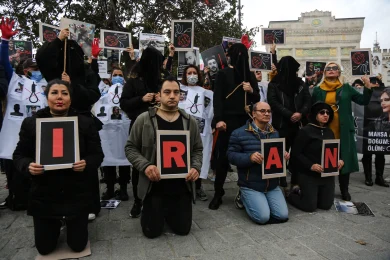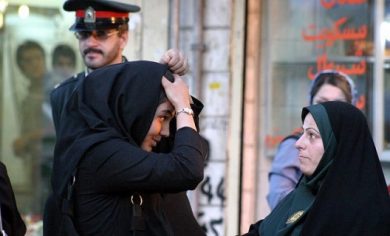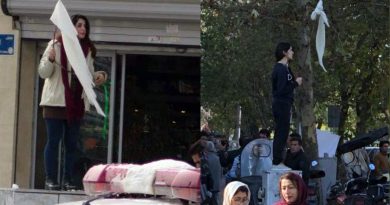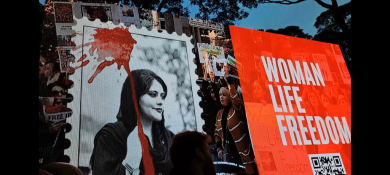In the depths of Iran’s most notorious prisons—Evin, Qarchak, Sepidar—a quiet but powerful resistance persists. These are not just places of confinement; they are symbols of the state’s fear. Behind the iron bars, Iranian women political prisoners are waging a different kind of war—a war of words, will, and unwavering resistance.
While the Islamic Revolutionary Guard Corps (IRGC) uses surveillance, torture, and long sentences to silence dissent, it has failed to extinguish the spirit of the women it has tried to suppress. From their prison cells, they write letters, stage hunger strikes, endure brutal interrogations, and continue to inspire a nation—and the world.
This report brings together the untold stories of these women—their courage, pain, and unbreakable resolve.
A Nation of Prisoners, A Generation of Leaders
Since the nationwide uprising in September 2022, triggered by the killing of 22-year-old Mahsa Amini in police custody, Iranian women have led the charge for change. With the powerful slogan “Women, Life, Freedom”, they have transformed Iran’s streets, classrooms, and digital spaces into battlegrounds for justice.
But that bravery has come at a cost.
Thousands have been arrested. Many remain imprisoned without formal charges. And yet, behind bars, these women continue to lead.
Evin Prison: The Iron Heart of Repression
Evin Prison, located in Tehran, is one of the regime’s most infamous detention centers. Controlled in part by the IRGC, it houses dozens of journalists, activists, and students. Its walls have long been a fortress of secrets, but stories of resistance continue to leak out.
Narges Mohammadi: Nobel Laureate, Political Prisoner
Perhaps the most well-known voice behind bars is Narges Mohammadi, a human rights defender who has spent years in and out of prison for her activism. In 2023, she was awarded the Nobel Peace Prize, while still incarcerated in Evin.
Mohammadi has:
• Led hunger strikes protesting poor prison conditions.
• Documented torture and abuse of other women prisoners.
• Written letters to the United Nations and media outlets, urging global attention.
In one letter, smuggled out of prison, she wrote:
“The prison bars have not silenced me. They’ve only strengthened my voice.”
Qarchak Prison: A Place of Abuse and Resistance
Located in Varamin, Qarchak is often described as one of the worst prisons for women in the Middle East. Formerly a livestock quarantine facility, it has been transformed into a squalid hellscape for political prisoners.
Conditions include:
• Overcrowding (up to 20 women in one cell).
• Poor sanitation and lack of medical care.
• Physical and psychological abuse by guards.
• Deliberate mixing of violent criminals and political prisoners.
And yet, women like Sepideh Gholian, Atena Daemi, and Zahra Safaei continue to resist.
Sepideh Gholian: Out, Arrested, and Unbowed
After her release in 2023, journalist and labor activist Sepideh Gholian walked straight to the gates of Evin and shouted:
“Khamenei is a murderer, his rule is illegitimate!”
She was immediately re-arrested.
Her bravery became a viral moment, galvanizing protests both in Iran and abroad. Her story exemplifies how even temporary freedom is used to make a louder statement.
Hunger Strikes as a Weapon
Many imprisoned women resort to hunger strikes to protest:
• Denial of medical treatment
• Solitary confinement
• Inhumane prison conditions
• Denial of contact with family and lawyers
In 2024 alone, over a dozen female prisoners, including Leila Hosseinzadeh and Bahareh Hedayat, have gone on hunger strikes—some lasting more than 20 days.
Their bodies weaken, but their message grows stronger:
“We may be caged, but we are not defeated.”
Letters That Move the World
From behind bars, these women send letters that are smuggled out and published globally. These letters:
• Detail sexual abuse, torture, and intimidation.
• Denounce the Islamic Republic as illegitimate.
• Call for international solidarity and pressure.
These words have made their way to the halls of the European Parliament, the United Nations, and global human rights forums.
They do not ask for pity—they demand justice.
The Role of the IRGC
The IRGC plays a critical role in these abuses. Its intelligence division monitors, interrogates, and detains female activists under national security laws.
Women are often charged with vague, politically motivated crimes such as:
• “Acting against national security”
• “Propaganda against the regime”
• “Corruption on Earth”
Trials are often held in secret. Sentences are long. Torture is routine.
The IRGC seeks to make examples out of women who speak too loudly—but the tactic is failing. Every arrest only fuels more resistance.
Why the Regime Fears Women
Women activists in Iran are not only resisting gender laws; they are challenging the ideological foundation of the regime. Their defiance cuts to the heart of a system built on control, especially over women’s bodies and voices.
Their protests—against compulsory hijab, unequal legal rights, and state violence—are inherently revolutionary.
By leading, women are proving that the struggle for democracy and equality in Iran is one and the same.
International Support and Global Campaigns
Campaigns such as:
• #FreeIranianWomen
• #WomenLifeFreedom
• #BanIRGC
have gained traction around the world, led by the Iranian diaspora, celebrities, human rights organizations, and ordinary people.
Countries like the United States, Germany, and Canada have sanctioned IRGC officials involved in human rights abuses. The European Union has been pressured to formally designate the IRGC as a terrorist organization—a move that activists say is long overdue.
How You Can Help
1. Amplify their voices
• Share their stories on social media.
• Follow Iranian activists and journalists.
2. Call on your government
• Demand stronger action against IRGC-linked officials.
• Support asylum and protection for exiled activists.
3. Support human rights organizations
• Donate or volunteer with groups working for justice in Iran.
4. Don’t look away
• Stay informed.
• Keep these stories in the public eye.
Conclusion: Bars Don’t Silence Bravery
The women of Iran are fighting a war they never asked for—against a regime that fears their voice, their ideas, and their strength.
From the darkness of prison cells, they are lighting the path to a future built on freedom, equality, and dignity.
Join Our Newsletter!
Stay informed with the latest updates, news, and ways to take action in the fight for justice and global security. Sign up now to get updates delivered straight to your inbox!





